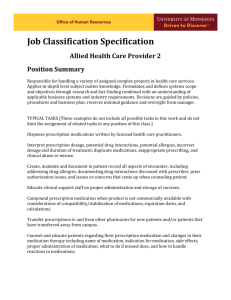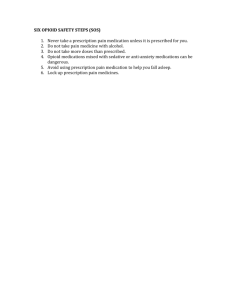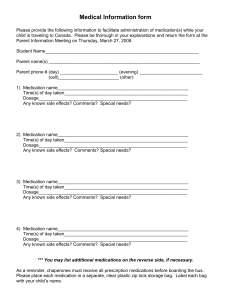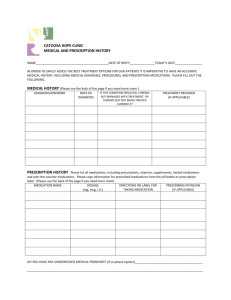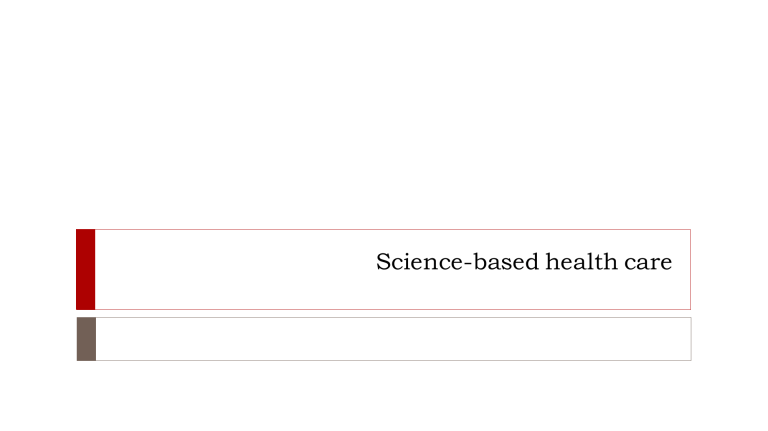
Science-based health care Science-based health care Prevention Diagnosis Treatment of disease Based on modern, scientific principles Should be evidence-based History of medicine Ancient times Scientific advances in the 1900’s Anatomy Different concepts of disease Anesthesia Antiseptic techniques Germ theory Vaccines By 1930’s medical schools were all science based Good health care is a partnership Between you and the medical team Primary care provider can act as an organizer Add other members to the medical team as necessary Between members of your medical team Some offices have access to multiple specialties Electronic medical records can help Write about a healthcare experience you’ve had. What did you like about it? What didn’t you like? What are some qualities of a good doctor? A good health care professional Is intelligent, knowledgeable, and sympathetic Recommends preventive measures Has enough time to discuss things in detail Provides clear explanations of diagnosis, tests, and treatments Refers to specialists if necessary Provides phone or email consultations Is available for emergencies or provides coverage during off-hours Charges reasonable fees and will discuss them Is on staff of an accredited hospital Keeps up-to-date with new medical knowledge Types of health care personnel Medical Doctors (M.D.) or Osteopathic Physicians (D. O.) Specialists – cardiologists, neurologists, gynecologists Limited scope: optometrists, dentists, psychologists, podiatrists and dieticians Nurses (R.N., N.P.) Allied health-care personnel EMTs and paramedics Laboratory technicians Physical therapists Physician assistants (P.A.) and many others How do you find a physician? Medical authorities recommend a primary care provider Some ideas Ask for recommendations Check with your insurance Decide on the type of physician you need Look for these: Board certification Affiliation with a hospital Patient reviews Availability of provider by phone or email Think about office organization Is the office organized? Are appointments easy to schedule and timely? Think of the first visit as an interview Schedule an evaluation with a physical exam Does the provider take a thorough history? Is it easy to ask questions and talk about your concerns? Do you get a thorough answer? Does the provider explain the tests, diagnosis and treatments? Was there enough time in the appointment or did you feel rushed? Do you like her personality? Patient rights Information about benefits, risks and cost of any screening, test or treatment Make decisions about care Accept or refuse any care Confidentiality and privacy (HIPAA) Continuity of care Courtesy, respect, dignity, timely attention NYS Patient rights Be prepared! Insurance information Family history Your own health history or a personal health record Any medications or supplements you take Write down symptoms and questions You can bring someone with you Basic medical care History and physical exam Lab tests and procedures How often should you get a full examination? Depends on your age, risk factors, symptoms Screening (e.g. cancer) Prevention Immunizations Medical imaging for diagnosis Medication Preventive care Primary prevention – preventing the disease from starting Secondary prevention – detecting and treating disease early Can be more cost-effective Can increase quality of life Can make treatment more effective U.S. Preventive Services Task Force issues recommendations Cancer screening Breast cancer – mammography Cervical cancer – Pap smear Colorectal cancer Fecal occult blood test every year OR Sigmoidoscopy every 5 years OR Colonoscopy every 10 years Prostate cancer No other screening is recommended for everyone, but based on your risk factors Medical imaging X-rays CT or CAT scans MRI Ultrasound Ask about risks and benefits Hospital care issues Emergency room visits Teaching hospitals Hospital-acquired infections Waiting times, triage, types of problems that require ERs, insurance 1 in 25 hospital patients has a HAI every day Labor and delivery Hospital quality Issues with medical care Incompetence Impersonal care Malpractice Sexual misconduct Iatragenic illness Ethical dilemmas Should life be terminated if the illness is terminal and the person is suffering? Should people who are mentally ill be hospitalized against their will? Should surrogate motherhood be allowed? Should a family member be informed about a serious problem if the patient says no? Who should participate in experiments? Who should get an organ transplant? The intelligent patient Knows when to seek professional care Is a good communicator Gets a second opinion if necessary Remember, you may access your medical records If you think your doctor is incompetent or unethical, you can bring a complaint to the hospital or professional society Mental and Behavioral Help Mental health Emotional, psychological and social wellbeing Ability to handles stress, relate to others, and make decisions Can be disturbed by normal life events and stresses or other factors Diagnosable mental disorders Depression Anxiety ADHD Autism Substance abuse And others Who should seek help? Eating or sleeping too much or too little Pulling away from people and usual activities Having low or no energy Feeling numb, helpless or hopeless Smoking, drinking, or using drugs more than usual Feeling unusually confused, forgetful, on edge, angry, upset, worried, or scared Yelling or fighting with family and friends Having persistent thoughts and memories you can’t get out of your head Hearing voices or believing things that are not true Thinking of harming yourself or others Inability to perform daily tasks like taking care of your kids or getting to work or school Reasons people don’t seek help Mental illness stigma Don’t know where to go or who to talk to Cost Mental health marketplace can be confusing Mental health practitioners Psychiatrists (MD) Psychologists (PhD, PsyD, often master’s degree) Psychoanalysts Social workers (MSW, LCSW) Clinical mental health counselors Psychiatric nurses Specialized therapists/counselors Marriage and family therapists Sex therapists Substance abuse counselors Others – you should check their credentials! Compatibility is key! Methods of treatment Psychotherapy – persuasive or conversational approach Psychodynamic treatment Supportive therapy Cognitive therapy Behavioral therapy Interpersonal therapy Biofeedback Group therapy Marriage and family counseling Hypnosis in conjunction with other therapies Methods of treatment Drug therapy Antianxiety Antipsychotic Antidepressants Anti-manic Anti-obsessive-compulsive Antianxiety and antidepressant medications are overprescribed and overused Electroconvulsive therapy (ECT) Inpatient care Addiction programs How do you pick a therapist? Start with your primary care provider What type of help do you want or need? Which practitioner can help? Are they available in the community? How much can the patient pay? Similar to the process for selecting a physician, but may need to meet with several therapists Length of therapy will depend on the issue and the desired results Did it work? Symptoms will lessen Patients should learn and put to use coping skills and stress management Better behaviors may be adapted Thought patterns take longer to change Mismanagement of psychotherapy Psychotherapy should help patients become independent Be wary of overly simplistic advice Note any boundary violations Contact outside of the therapeutic session Talking about other patients Disclosing personal or intimate details Talking about therapist’s own problems Sexual exploitation Do self-help materials/products work? Most of these products have not been scientifically tested Many make extravagant claims Other practices and treatments Many practices have not been tested or have been found ineffective Do your research Be suspicious of claims that one product/practice can cure multiple illnesses Be suspicious of extravagant claims Drug products Drug vs. Medicine What is the definition of a drug? What is the definition of a medicine? Drug – any chemical substance that changes a biological process Medicine – a type of drug that: Prevent illness Cure disease Help with healing Suppress symptoms Drugs are used medicinally to produce a specific effect (main effect) Drug types Prescription More potent than non-prescription Pose greater risk Prescribed for conditions that can’t be self-treated Non-prescription (over-the-counter and behind-the-counter) Recreational Herbal Illicit (illegal) What is the most popular and most commonly used drug in the US? Opioid epidemic Started with misuse of prescription medications Next – heroin use increased Finally – synthetic opioids How do drugs come on the market? Must show they are SAFE and EFFECTIVE First, animal studies Three phases of human studies Phase I: Small group of participants to determine toxicity level Phase II: Small group to determine dosage, some effectiveness evidence Phase III: Large group randomized controlled trial (clinical trial) FDA reviews the evidence Post-marketing study Pharmacists Store, dispense medications and products Practice in communities, hospitals, clinics May offer vaccinations, with restrictions Was there a flu epidemic this year? Pharmacy technicians do tasks that don’t require pharmacist’s judgment Generic vs brand-name drugs Brand-name is the manufacturer’s property (e.g. Coumadin) Pharmaceutical companies hold patents on drugs for several years Generic usually means active chemical(s) in the drug (e.g. warfarin) Should be therapeutically equivalent to brand-name Should meet FDA requirements Usually contains same dosage of active ingredient, but other non-active ingredients Often cost less Drug interactions Two or more substances taken together may interfere with each other Alcohol can combine with other depressants Foods can interact with drugs E.g. aspirin and anti-coagulant drugs E.g. dairy (calcium) and tetracycline E.g. grapefruit juice can increase absorption and slow breakdown Herbs and dietary supplements can have unfavorable interactions Check whether there are interactions! Drug recalls Manufacturer removes a product from the market FDA can request or order a recall Drug recalls are listed here If a drug is new, ask your doctor how it’s different from others and why it’s better Internet drugs Most US chains have websites where you can order refills Some sites may not be legitimate Buying from companies outside of the US Risks: getting the wrong medication, adverse events, serious side effects Risks: different manufacturing standards, mislabeling, contamination It is important to see a healthcare provider before using prescription drugs Self-care Actions we take to promote health, prevent disease, treat minor ailments Emotional, physical, spiritual and psychological health Are you taking care of yourself? What are some examples? Nutrition Exercise Getting enough sleep Time management Keeping a diary Treating minor ailments with nonprescription medication Over-the-counter (OTC) drugs External analgesics Internal analgesics Aspirin Acetaminophen Ibuprofen, Naproxen, Ketoprofen (NSAIDS) Antacids + heartburn remedies Cough and cold Decongestants Expectorants Cough suppressants Antimicrobials Sore-throat products Antihistamines (allergy products) Opthalmic products Diarrhea remedies Laxatives Smoking replacement therapy Sleep aids Motion sickness remedies Group activity – what information can you find on prescription and nonprescription drug packages OTC drug label Medicine cabinet • Keep away from humidity • Keep out of reach of children • Discard when expired or if it changed in color, odor or consistency Prudent use of medication You should know: Name and purpose of drug How and when to take it, including special instructions Possible side effects What to do if you miss a dose How long you should take the drug Whether a generic form is available Any potential interactions Doctors should communicate this information to you before you use the drug When traveling, make sure to take enough medication Safety precautions Tell your doctor about any medications and dietary supplements you use Follow the recommended dosage If you have a difficult time remembering to take a dose, set an alarm Look for warning labels Clean our your medicine cabinet Pay attention to possible adverse effects Antibiotic resistance Improper use of antibiotics Over-prescription Not finishing the dosage Superbugs! Antibiotic resistance May also be caused by antibiotics in food production Most antibiotics in the US are used in farming Antibiotic resistance Antibacterial soaps and other cleaning products Use non-antibacterial products

